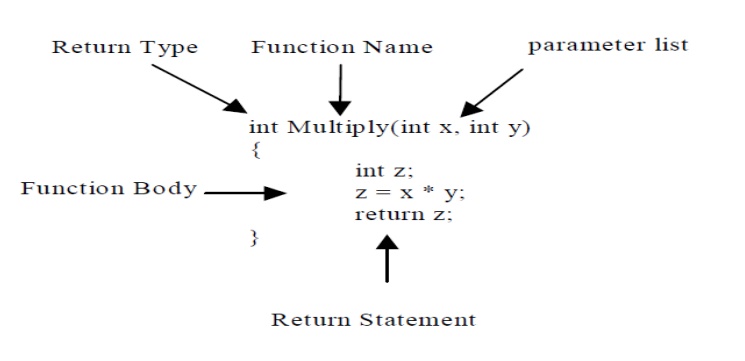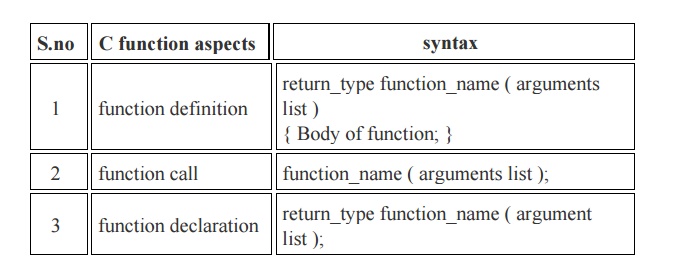Chapter: Computer Programming
Functions - C Programming
FUNCTION
§ Functions
are created when the same process or an algorithm to be repeated several times
in various places in the program.
§ Function
has a self-contained block of code, that executes certain task. A function has
a name, a list of arguments which it takes when called, and the block of code
it executes when called.
§ Functions
are two types:
ü Built-in
/ Library function.
ex:)
printf(), scanf(), getch(), exit(), etc.
ü User
defined function.
User-Defined Functions
Functions
defined by the users according to their requirements are called user-defined
functions. These functions are used to break down a large program into a small
functions.
Advantage of User defined function:
1. Reduce
the source code
2. Easy to
maintain and modify
3. It can be
called any where in the program.
Body of user defined function:
return_type
f_name (argument1,argument 2)
{
local
variables; statements; return_type;
}

The body of user-defined shows that an user-defined
functions has following characteristics:
1. Return
type
2. Function
name
3. Parameter
list of arguments
4. Local
variables
5. Statements
6. Return
value

S.no C function aspects : syntax
1 function definition
return_type
function_name ( arguments list )
{ Body of
function; }
2 function call
function_name
( arguments list );
3 function declaration
return_type function_name ( argument list );
Note: The function with return value
must be the data type, that is return type and return value must be of same data type.
User defined function has three parts:
1.
Declaration part
ret_type
f_name (arguments)
2.
Calling part
f_name(arguments);
3.
Definition part
Function Parameters:
Parameters
provide the data communication between calling function and called function.
Two types:
§ Actual
parameters:
These are
the parameters transferred from the calling function[main function] to the
called function[user defined function].
§ Formal
parameters:
Passing
the parameters from the called functions[user defined function] to the calling
functions[main function].

Note:
§ Actual parameter – This is the argument which is used in
function call.
§ Formal parameter – This is the argument which is used in
function definition.
1 Categories of User defined function/Function
Prototypes:
§ A
function prototype declaration consists of the function‟s return type, name and
arguments list.
§ Always
terminated with semicolon. The following
are the function prototypes:
1. Function
without return value and without argument.
2. Function
without return value and with argument.
3. Function
with return value and with argument.
4. Function
with return value and without argument.
Note: Function with more than one
return value will not have return type and return statement in the function definition.
Consider the following example to multiply two
numbers:
void
main( )
{
int
x,y,z;
scanf(“%d%d”,
&x,&y);
z=x* y;
printf(“The
result is %d”, z);
}
1.
Function without return value and without argument
In this
prototype, no data transfers takes place between the calling function and the
called function. They read data values and print result in the same block.
Syntax:
void
f_name(); //function declaration
void
f_name (void) //function definition
{
local
variables; statements;
}
void
main()
{
f_name(); //function call
}
The above example can be rewritten by creating
function:
void
f_mult(); //function definition void f_mult(void )
{
int
x,y,z; scanf(“%d%d”, &x,&y); z=x* y;
printf(“The
result is %d”, z);
}
void
main()
{
f_mult();
}
2.
Function without return value and with argument
In this
prototype, data is transferred from the calling function to called function.
The called function receives some data from the calling function and does not
send back any values to the calling functions.
Syntax:
void
f_name(int x, int y ); //Function
declaration
void
f_name (int x, int y) //Function
Definition //Formal Parameters
{
local
variables;
statements;
}
void
main()
{
//variable
declaration //input statement
f_name(c,
d); //Function call //Actual Parameters
}
The above example can be
rewritten by creating function void f_mult(int x, int y);
void
f_mult(int x, int y )
{
int z; z=x* y;
printf(“The
result is %d”, z);
}
void
main()
{
int c, d;
printf(“Enter
any two number”); scanf(“%d%d”, &c, &d); f_mult(c, d); //Function call
}
3.
Function with return value and without argument
The calling function cannot pass any arguments to
the called function but the called function may send some return value to the
calling function.
Syntax:
int
f_name(); //Function declaration
int
f_name (void) //Function
Definition
{
local
variables;
statements;
return
int;
}
void
main()
{
//variable
declaration
ret_var=f_name(); //Function call
}
The above example can be rewritten by creating
function int f_mult();
int
f_mult(void )
{
int
x,y,z; scanf(“%d%d”, &x,&y); z=x* y;
printf(“The
result is %d”, z); return(z); }
void
main()
{
int c;
c=f_mult(); getch();
}
4.
Function with return value and with argument
In this
prototype, the data is transferred between the calling function and called
function. The called function receives some data from the calling function and
send back a value return to the calling function.
Syntax:
int
f_name (int x, int y); //Function declaration
int
f_name (int x, int y) //Function
definition //Formal Parameters
{
local
variables;
statements;
return
int;
}
void
main()
{
//variable
declaration //Input Statement
ret_value=f_mult(a,
b); //Function Call //Actual
Parameters
}
The above example can be rewritten by creating
function: int f_mult(int x, int y);
int
f_mult(int x, int y)
{
int z;
z=x* y;
printf(“The
result is %d”, z); return(z);
}
void
main()
{
int
a,b,c;
printf(“Enter
any two value:”); scanf(“%d%d”, &a, &b); c=f_mult(a, b);
}
Note:
§ If the return data type of a function is “void”, then, it can‟t
return any values to the calling function.
§ If the return data type of the function is other than void such
as “int, float, double etc”, then, it can return values to the calling
function.
return statement:
It is
used to return the information from the function to the calling portion of the
program.
Syntax:
return;
return();
return(constant);
return(variable);
return(exp);
return(condn_exp);
By
default, all the functions return int data type.
Do you know how many values can be return from C
functions?
§ Always, only one value can be returned from a function.
§ If you try to return more than one values from a function, only
one value will be returned that appears at the right most place of the return
statement.
§ For example, if you use “return a,b,c” in your function, value
for c only will be returned and values a, b won‟t be returned to the program.
§ In case, if you want to return more than one values, pointers
can be used to directly change the values in address instead of returning those
values to the function.
Function Call:
A
function can be called by specifying the function_name in the source program
with
parameters,
if presence within the paranthesis.
Syntax:
Fn_name();
Fn_name(parameters);
Ret_value=Fn_name(parameters);
Example:
#include<stdio.h>
#include<conio.h>
int
add(int a, int b); //function
declaration
void
main()
{
int
x,y,z;
printf(“\n
Enter the two values:”);
scanf(“%d%d”,&x,&y);
z=add(x,y); //Function
call(Actual parameters)
printf(“The
sum is .%d”, z);
}
int
add(int a, int b) //Function
definition(Formal parameters)
{
int c;
c=a+b;
return(c); //return
statement
}
2 Parameter Passing Methods/Argument Passing
Methods
Call by
Value/Pass by Value:
When the
value is passed directly to the function it is called call by value. In call by
value only a copy of the variable is only passed so any changes made to the
variable does not reflects in the calling function.
Example:
#include<stdio.h>
#include<conio.h>
swap(int,int);
void main()
{
int x,y;
printf("Enter
two nos"); scanf("%d %d",&x,&y);
printf("\nBefore
swapping : x=%d y=%d",x,y); swap(x,y);
getch();
}
swap(int
a,int b)
{
int t;
t=a; a=b; b=t;
printf("\nAfter
swapping :x=%d y=%d",a,b);
}
System Output:
Enter two
nos 12 34
Before
swapping :12 34
After
swapping : 34 12
Call by
Reference/Pass by Reference:
When the
address of the value is passed to the function it is called call by reference.
In call by reference since the address of the value is passed any changes made
to the value reflects in the calling function.
Example:
#include<stdio.h>
#include<conio.h>
swap(int *, int *); void main()
{
int x,y;
printf("Enter
two nos"); scanf("%d %d",&x,&y);
printf("\nBefore
swapping:x=%d y=%d",x,y); swap(&x,&y);
printf("\nAfter
swapping :x=%d y=%d",x,y); getch();
}
swap(int
*a,int *b)
{
int t;
t=*a; *a=*b; *b=t;
}
System Output:
Enter two
nos 12 34
Before
swapping :12 34
After
swapping : 34 12
Call by Value
This is
the usual method to call a function in which only the value of the variable is
passed as an argument
Any alternation
in the value of the argument passed does not affect the function.
Memory
location occupied by formal and actual arguments is different
Since a
new location is created, this method is slow
There is
no possibility of wrong data manipulation since the arguments are directly used
in an application
Call by Reference
In this
method, the address of the variable is passed as an argument
Any
alternation in the value of the argument passed affect the function.
Memory
location occupied by formal and actual arguments is same and there is a saving
of memory location
Since the
existing memory location is used through its address, this method is fast
There is
a possibility of wrong data manipulation since the addresses are used in an
expression. A good skill of programming is required here
Library Functions:
C language provides built-in-functions called
library function compiler itself evaluates these functions.
List of
Functions
ü Sqrt(x)
-- > (x)0.5
ü Log(x)
ü Exp(x)
ü Pow(x,y)
ü Sin(x)
ü Cos(x)
ü Rand(x)->
generating a positive random integer.
3 Recursion in C:
Recursion
is calling function by itself again and again until some specified condition
has been satisfied.
Syntax:
int
f_name (int x)
{
local
variables;
f_name(y);
// this is recursion statements;
}
Example_1:
Factorial using Recursion
#include<stdio.h>
int
res,x;
printf(“\n
Enter the value:”); scanf(“%d”, &x); res=factorial(x);
printf(“The
factorial of %d is ..%d”, res);
}
int
factorial(int n)
{
int fact;
if (n==1) return(1); else
fact =
n*factorial(n-1); return(fact); }
Example_2:
Fibonacci using Recursion
#include<stdio.h>
#include<conio.h>
int Fibonacci(int); int main()
{
int n, i
= 0, c; scanf("%d",&n); printf("Fibonacci series\n");
for ( c = 1 ; c <= n ; c++ )
{
printf("%d\n",
Fibonacci(i)); i++;
}
return 0;
}
int
Fibonacci(int n)
{
if ( n ==
0 ) return 0;
else if (
n == 1 ) return 1;
else
return (
Fibonacci(n-1) + Fibonacci(n-2) );
}
Example_3:
Sum of n Natural Numbers
#include<stdio.h>
#include<conio.h> int add(int n); void main()
{
int m, x;
printf("Enter
an positive integer: "); scanf("%d",&m);
x=add(m);
printf("Sum = %d", x); getch();
}
int
add(int n)
{
if(n!=0)
return
n+add(n-1); /* recursive call */
}
Related Topics